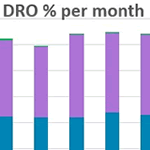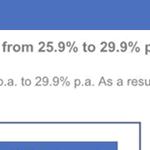Misleading DMP advice Mrs B was advised to go into a Debt Management Plan (DMP) by an IVA firm. They referred her to a firm that charges fees for running a DMP. I suggested that she should talk to StepChange or another provider that doesn't charge any fees for a DMP. Mrs B went back and queried the advice with the IVA firm. This is the WhatsApp conversation: I explained to Mrs B that … [Read more...]
General debt news & policy
Here are my articles on news and policy except for high cost credit and Insolvency, which are separate as there as so many of them.
Barclaycard cuts minimum payments – this may cost you a lot
In April 2024, Barclaycard has told many customers that it will be setting lower minimum payments on their accounts from July. From a poll I ran on Instagram, Barclaycard has informed about 90% of cardholders. It looks as though this change is going to be across the board, affecting everyone. The messages are going out by email, letter or text. Look out for the communication if you haven't yet … [Read more...]
The new DRO hubs – what happened in 2023
In January the Insolvency Service published data showing how the volumes of Debt Relief Orders (DROs) done by advice agencies changed in 2023, see Monthly IS statistics Jan-Dec 23, Table 3.2. In February 2023, the two new MaPS-funded DRO hubs began operating. These are run by Citizens Advice and Money Wellness (called Benesse Advice in the IS statistics, also known to debt advisers as Gregory … [Read more...]
Big hikes in Paypal interest rate & minimum payments
Paypal's interest rate increases Readers have reported getting an email from Paypal in June or July saying their interest rate will be going up a lot. In the email, Paypal warns: You will pay more each month and take longer to repay any outstanding balance on your account. Not good! A poll I ran on Instagram suggested more than half the Paypal accounts in the UK may be seeing an interest … [Read more...]
Are you still paying fees on an old Gregory Pennington DMP?
For many years Gregory Pennington (GP), part of the Financial Wellness Group (FWG), has charged its clients monthly fees for running Debt Management Plans (DMPs) But MaPS awarded Gregory Pennington a contract that began on 1 February 2023. And it can't charge fees for DMPs under this contract. StepChange, Payplan and CAP have always provided "fee-free" DMPs, where all a client's payments go … [Read more...]
ClearScore adopts the new Equifax credit scoring out of 1000
In mid November 2021, ClearScore has finally adopted the new 1000 Equifax credit scores. Equifax credit scoring changed in April 2021, when it switched to calculating scores out of 1000 - they used to be calculated out of 700. It also changed the bands used to describe your credit rating. Equifax didn't make an announcement about these changes. The Equifax Credit Report & Score was … [Read more...]
FCA to look into unregulated credit such as Klarna & Wagestream
On 16 September, the Financial Conduct Authority (FCA) announced a review into unsecured credit market regulation. This will be chaired by Christopher Woolard, the outgoing interim Chief Executive, which suggests how seriously the FCA sees this subject. The FCA says: The Review will concentrate on how regulation can better support a healthy unsecured lending market. It will take into … [Read more...]
DWP minister says SMI loan ‘can be backdated’
Support for Mortgage Interest (SMI) is changing on 6 April 2018 from being paid as a welfare benefit to being given as a secured loan. Kit Malthouse, a DWP Minister, told Radio 4's Moneybox on 17 March that he was "relatively confident we will be in a good position when it [6 April] comes." He stated that people who did not apply for the new loan by then will be able to have it … [Read more...]
DWP chaos? Only 10,000 have agreed to new SMI loan
The Office for Budget Responsibility (OBR)'s Economic and Fiscal Outlook paper, published today with the Chancellor's Spring Statement, has this statement: DWP has told us that all current claimants have been contacted about the intention to convert their [Support for Mortgage Interest] award into a loan and of those that have responded, over half have indicated they are not interested while less … [Read more...]
MoJ consultation on default CCJs
I have responded to the Ministry of Justice's consultation on Default County Court Judgements (CCJs). This consultation was started in December 2017, because of: concern about the potential adverse impact of a County Court judgment on individuals who, unaware that a judgment had been made against them, found months or years later that their credit rating had been damaged. This article expands on … [Read more...]









